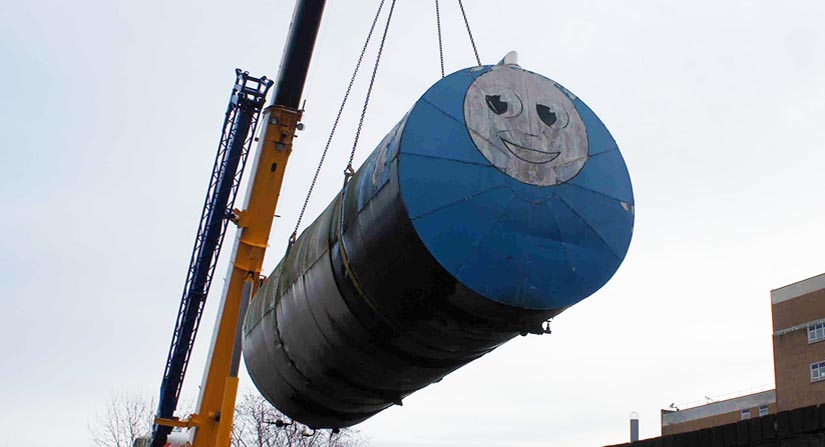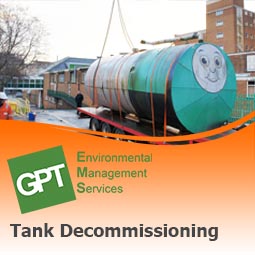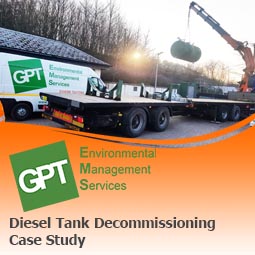Oil & Chemical Tank Decommissioning

We have over 20 years’ experience in the cleaning, decommissioning and removal of oil and chemical tanks to ensure redundant tanks are decommissioned safely to prevent harm to people, the environment and property. Our chemical and oil tank decommissioning projects are always stringently planned to ensure the project is completed safely, in the most cost effective manner and in compliance with legislative requirements and industry best practice.
We can decommission all types and sizes of redundant tanks no matter what they have been used to store including:
- Heating oils
- Diesel
- Cooking oils
- Hydraulic oil
- Fuel oils
- Heavy Fuel Oil – HFO – We can install new heating coils to reduce viscosity if the heating coils have been removed.
- Strong Alkalis
- Strong Acids
- Foodstuffs e.g. milk and beer
A typical tank decommissioning project will include:
Site visit & planning the project
We will conduct a site visit to assess the condition, specification and contents of the redundant tanks and ascertain if there are any site restrictions which would impact on the safe and timely removal of the tanks. Removing a tank can cause operational concerns for the site so it is essential a thorough assessment is undertaken to prevent any unnecessary delays. Before commencing any work the client will be issued with a thorough Risk Assessment & Method Statement to ensure they are satisfied the project has been planned appropriately.
Sampling residual liquids
In order to ensure health and safety is prioritised during the project and that the disposal method of any residual liquids is legally compliant and the most cost effective option a sample of the contents will usually be taken and sent to laboratory for analysis.In many cases residual oils will hold commercial value which can be offset against the cost of the project. In some cases whole tank decommissioning projects can be completed on a cost neutral basis due to the commercial value of the oil, see the Diesel tank decommissioning case study for more information. Unfortunately tanks are often left redundant for years before they are decommissioned which can allow the product to develop impurities which lower its commercial value.
Isolation and waste removal
All residual liquids will be drained and/or pumped out and disposed of correctly. Any residues which cannot be drained will be removed mechanically by a vacuum tanker or where necessary manually by a confined space entry and breathing apparatus trained team.Confined Space Entry teams will be equipped with a gas detector to warn them of any dangerous e.g. explosive atmospheres.
Decontamination of tanks
The tanks will be thoroughly cleaned to remove all hazardous residues, for steel tanks this will allow them to be recycled as scrap metal which will again have a commercial value to the client.Cleaning can be undertaken using water, a suitable degreaser or using steam.Cleaning can be undertaken in situ or at a licenced site after removal.
Purging
If a tank is to be entered or hot works to be conducted the tank will require purging (the removal of flammable gases or vapours) or made inert before these works can commence.
Tank Cutting/Dismantling
If access issues make it unsafe or uneconomical to remove the tank intact the tank can be dismantled in situ using hot and cold cutting techniques. Ideally the tank will be removed intact and dismantled at a more practical location.
Tank Removal & Disposal
Once safe to do so the tanks will be removed via a crane/Hiab and transported under our upper tier hazardous waste licence to a licenced waste facility for disposal.
Decontamination and removal of associated infrastructure
This can include removal/capping of pipework and decontamination of plinths and bunds often to a level where they can be disposed of as inert waste.
Contaminated Land Testing & Remediation
where tanks have potentially caused contamination to the surrounding land we can undertake a Site Investigation to establish any contamination and can undertake remediation works to remove any contamination which is discovered.
Specific industries and different sizes and types of tank have specific guidance on how to decommission them. GPT structure every tank decommissioning project to follow the relevant legislation and best practise guidance that applies to the specific tank including APEA – Blue Book and OFTEC TECHNICAL BOOK 3 - Decommissioning Oil Storage Tanks.
CASE STUDY
Oil and chemical tank removals pose major environmental and health and safety risks, in 2016 a major utility company and their subcontractor were fined over £900,000 after a poorly planned tank removal job led to a serious pollution incident.In this incident 300 litres of residual sodium hypochlorite was diluted with water and discharged to the storm drainage system killing virtually all aquatic organisms for a 1 mile stretch of river. If this residual liquid had been pumped out, the incident could have been avoided preventing a major pollution incident and a substantial fine for the companies involved.
Tank Decommissioning Case Studies


Extracts from legislation and guidance
“The improper removal of an oil storage tank can result in a serious accident and/or pollution incident. Therefore, it is necessary to consider all potential safety and environmental hazards and subsequently, adopt appropriate precautionary measures.”
The OFTEC TECHNICAL BOOK - Decommissioning Oil Storage Tanks
"As part of the decommissioning process you should:
- Carry out a full environmental risk assessment.
- Sample any surrounding soil and groundwater (you should do this before, during and after decommissioning) - the results from this will be important in your risk assessment.
- Remove any residual product from the tank and pipes (this is called ‘bottoming’).
- Remove any explosive vapours from the tank and pipes to make them safe, before removing them from the ground.
- Remove and then clean tanks, pipes, dispensers and separators"
Government Advice - Decommissioning an underground storage tank
"When you stop using a container you must make sure it doesn’t cause pollution. Above or below ground tanks need specialist decommissioning then removal off site by a registered waste carrier."
Environment Agency guidance - Pollution prevention for businesses
"After your tank has been decommissioned or removed, check that the surrounding soil or groundwater hasn’t been contaminated. This can include testing surface and subsurface soil and groundwater samples for products relating to what you were storing. If contamination is found, take action as soon as possible to remove the pollution."
Above ground oil storage tanks: GPP 2
